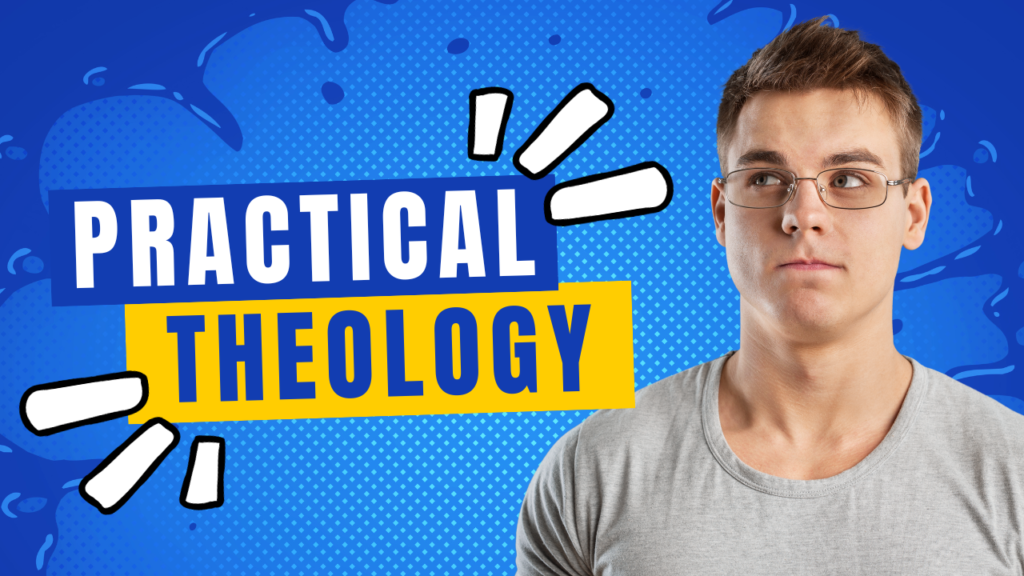The Practical Theology Journey: Real-Life Faith
Have you ever wondered how your faith connects to real life? Practical theology, a liberal arts degree, explores exactly that—the intersection of Christian belief and everyday living. This fascinating field applies theological principles to practical ministry contexts. Let’s dive deeper into the world of practical theology.
What is Practical Theology?

Practical theology is a branch of theology degree that examines Christian traditions and sacred texts, interpreting their relevance for modern times. It goes beyond theory to ask: How should faith inform action? Theology meets reality in practical theology programs, equipping students to minister effectively. Coursework emphasizes skills for ministry leadership, counseling, and community engagement. Students learn to apply theological knowledge to real-life needs.
Key Questions in Practical Theology Include:
- How do biblical truths speak to current cultural challenges?
- What wisdom guides faithful living today?
- How can churches nurture spiritual growth?
- How can theology promote human flourishing?
This hands-on discipline prepares students for ministry careers. It also develops lay leaders’ theological understanding. All who want their faith to intersect with real life can benefit from this degree.
What is Covered by a Practical Theology Degree?
Degrees under this field provide a well-rounded education in biblical knowledge, theological understanding, and real-world ministry competencies. Students take core courses in Old and New Testament scriptures, systematic theology, ethics, church history, and philosophy. This provides a robust theological foundation.
Programs also cultivate spiritual formation through prayer, worship, and service. On the practical side, students develop skills in preaching, counseling, leadership, community organizing, and more. Courses address topics like ministry to families, youth, and marginalized groups. Internships and mentored field experience offer the chance to apply learning. Graduates gain both theoretical knowledge and practical abilities to serve faith communities.
Common Topics Covered in a Degree in Practical Theology

Biblical Studies
Practical theology degrees provide extensive biblical training. Students take courses that cover the Old and New Testaments in-depth, studying the texts in their original languages. They learn tools for biblical exegesis, interpretation, and application.
Coursework explores the history, culture, and literature genres of the Bible. Students gain perspective on how to relate scriptural truths to modern contexts. They learn to teach and preach the Bible in ways that illuminate meaning for today.
Church History
Studying church history helps students understand theological developments over time. It surveys major movements, figures, doctrines, and texts through the centuries. Courses cover topics like early church formation, medieval theology, the Reformation, revivalism, and the modern church.
Students gain perspective on historical influences that shape today’s theology and denominations. They learn to evaluate continuity and change in Christian thought and practice over time.
Christian Ethics
Christian ethics courses equip students to apply moral reasoning to real dilemmas. They explore ethical systems, biblical norms, and church positions on issues. Students analyze case studies on topics like bioethics, sexuality, social justice, war, and the environment.
They learn to think critically about ethics and assess moral viewpoints. Courses aim to cultivate wisdom in ethical decision-making for ministry.
Pastoral Care and Counseling
Pastoral care and counseling courses teach strategies for supporting people spiritually and emotionally. Students learn foundations of mental health counseling and therapy models. They study counseling techniques and develop listening, empathy, and communication skills.
Courses address counseling issues like grief, relationships, addiction, trauma, and spiritual crisis. Students gain competencies for providing pastoral care in one-on-one and group settings. Clinical pastoral education allows for mentored practice.
Practical Skills Learned in Practical Theology
Preaching
Homiletics and preaching courses help students deliver theologically sound sermons that connect to contemporary life. Classes cover sermon preparation, biblical exegesis, audience analysis, and effective public speaking. Students learn to choose impactful topics, craft compelling content, and add illustration and passion. They practice preaching and get feedback on style, structure, and engagement. The goal is to prepare excellent biblical communicators.
Leadership
Leadership training develops skills for guiding faith communities and organizations. Courses teach leadership models, team building, motivation, conflict resolution, and change management. Students assess their leadership gifts and grow in abilities like strategic planning, decision-making, and mentoring others. The focus is to model servant leadership as exemplified by Christ.
Community Organizing
Community organizing courses teach skills for catalyzing positive change. Students learn asset-based development strategies, coalition building, and advocacy campaigns. They study examples of effective faith-based organizers. Courses cover conducting needs assessments, developing action plans, mobilizing volunteers, and accessing resources. Students may assist local partnerships addressing issues like poverty, education, housing, and criminal justice reform.
Youth Ministry
Youth ministry courses prepare students for engaging teenagers in the faith community. They explore adolescent development and youth culture trends. Students learn creative program ideas for worship, Bible study, service projects, retreats, and more. Courses also cover counseling teens, partnering with parents, and recruiting volunteers. Hands-on ministry experience helps students apply classroom learning.
Missions
Missions and intercultural studies expand students’ global competence for ministry. Courses survey world religions and analyze cross-cultural communication patterns. Students reflect on power dynamics, cultural sensitivity, and avoiding harm in mission work. Classes may cover skills like social entrepreneurship, community development, and congregational partnerships to serve vulnerable groups locally and globally.
Clinical pastoral education offers practical experience. Students get mentored field training in real ministry contexts. This integrates academic and practical learning.

Types of Practical Theology Degrees
Several degree options exist in practical theology:
- Associate’s in Practical Theology – Two-year programs offer basic training for ministry careers. Graduates may serve as youth ministers, chaplains, and lay leaders.
- Bachelor’s in Practical Theology – Four-year programs provide comprehensive biblical knowledge plus practical skills. Graduates are prepared for roles like children’s minister, missionary, or pastor.
- Master’s in Practical Theology – One to three-year graduate programs develop advanced theological understanding and ministry competency. Graduates may become senior pastors, counselors, nonprofit directors, or seminary professors.
- PhD in Practical Theology – Doctoral programs focus on research and scholarship. They prepare students for academic teaching and writing careers. Graduates contribute new knowledge to the field.
Why Study Practical Theology?
Practical theology appeals to those seeking relevant faith. Benefits of studying it include:
- Gaining deeper biblical literacy
- Understanding today’s cultural trends
- Developing real-world ministry skills
- Exploring the integration of faith and work
- Preparing for careers in ministry leadership
- Strengthening local church communities
- Promoting human dignity and justice
For both ministry professionals and laity, the degree cultivates wise and compassionate living.
Examples of Practical Theology
The possibilities are endless when theology intersects life. Practical theology allows Christians to live out their faith in ways that bless people – meeting real needs with the love of Christ.
The journey into practical theology leads to purposeful living.
Beyond mere theory, it awakens faith to act for good. With compassion and wisdom, practical theology scholars and ministry leaders can guide the church to effectively embody the Gospel. They help everyday Christians connect beliefs with practice in their families, jobs, relationships and communities.
This field engages real needs in the church and community. Here are some examples:
- Designing addiction recovery programs
- Training leaders in racial reconciliation
- Organizing alternative spring break trips to serve vulnerable populations
- Launching exercise and nutrition initiatives at local churches
- Creating workplace chaplaincy for stressed employees
- Counseling married couples in crisis
- Speaking up for just immigration policies
- Volunteer coaching for disadvantaged kids
- Teaching life skills classes for the unemployed
Frequently Asked Questions About Practical Theology
What is the book Theoretical-Practical Theology all about?
The book by Ray Anderson explores how to bridge the gap between theological theory and practical application. It advocates a critical and constructive engagement between theology and ministry practice.
What is the scope of practical theology?
The scope of this field encompasses the praxis of Christian faith—how theology intersects with everyday living and ministry contexts. It develops skills for relating timeless truths to current needs.
What is the purpose of studying practical theology?
The purpose is to understand how biblical principles can inform wise action in contemporary circumstances. It aims to equip everyday believers and ministry leaders to integrate faith and life.
What are the differences of practical theology and pastoral theology?
While interrelated, pastoral theology focuses on training clergy, while practical theology aims to develop every Christian’s theological practice. The latter also engages disciplines beyond pastoral ministry.
What are the models of practical theology?
Models include transformative practice-theory approaches, empirical approaches using social science, intercultural approaches, congregational studies models, and liberative approaches prioritizing social change.

Shane; I must speak with you please. I am an elder who must speak to you! 818-209-6888. It’s important